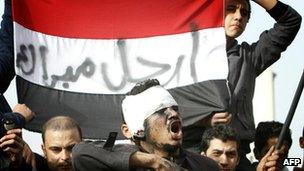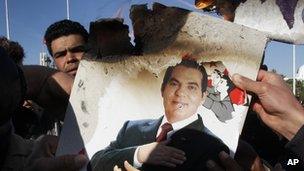BBC's Arab Spring coverage 'impartial' but 'could have been fuller'
- Published

The Arab Spring began in Tunisia in December 2010 and soon spread to other regions
The BBC's coverage of the Arab Spring was generally impartial but could have benefited from greater breadth and context, according to the BBC Trust.
It said the BBC should do more to make it clear how it has authenticated user-generated content (UGC), such as phone footage from activists or bystanders.
The Trust praised "the considerable courage of journalists and technicians on the ground to bring stories to air".
Its <link> <caption>report</caption> <url href="http://downloads.bbc.co.uk/bbctrust/assets/files/pdf/our_work/arabspring_impartiality/arab_spring.pdf" platform="highweb"/> </link> described the BBC's overall coverage as "remarkable".
Yet the report also said there could have been more extensive follow-up of stories in some countries, a fuller examination of the different voices of opposition, and a broader range of international reaction to the events.
The review was led by Edward Mortimer, a Middle East expert and former United Nations director of communications.
He praised the coverage of the 18 days of protests in Egypt leading to the fall of President Mubarak, the maintenance of a BBC presence on both sides of the conflict in Libya, and the coverage of the uprising in Tunisia.

Tunisia was the first Arab country to throw off its ruler, Zine El Abidine Ben Ali, in January 2011
But he expressed concern at the drop in the BBC's coverage of Egypt after President Mubarak's fall, and the delay in covering human rights abuses by rebel forces in Libya.
He also questioned the lack of coverage of Saudi Arabia, and the lack of a clear policy about the use of the word "regime" to describe governments that faced uprisings.
Mr Mortimer wrote that he was particularly impressed by "the skill and care the BBC applies to checking user-generated content" but said audiences should be given more information about this.
Analysis by Loughborough University found that in 74% of UGC cases studied, the BBC failed to offer "caveats about authenticity or representativeness".
The report said more effort should be made to draw the attention of viewers and listeners to the BBC News website.
This "provides a significant amount of background material, yet no cross-reference was made to it in 97 per cent of BBC news items". A BBC news executive told the report's author he felt strongly that greater effort should be made to do this.
The Trust said it commissioned the review not because it felt the BBC's coverage of the Arab Spring was deficient, but because it showed "the importance and complexities of a group of fast-moving stories which are often extremely dangerous to cover on the ground".
The BBC said it was pleased to see the report's broad support for its coverage as a whole and the overall recognition of much "outstanding" and "remarkable" journalism.
At the same time, it continued, "we also had to make sure we were covering major stories happening simultaneously elsewhere".
- Published25 June 2012
- Published25 June 2012
- Published24 June 2012